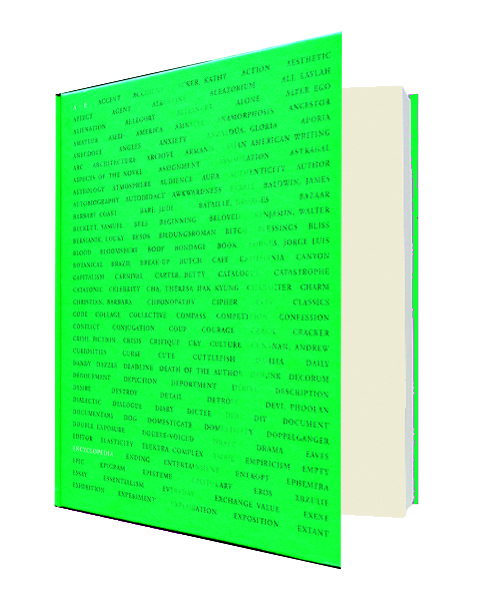A Review of Encyclopedia Volume I, A-E Edited by Tisa Bryant, Miranda F. Mellis, and Kate Schatz
Rick Moody
Denis Diderot is usually recognized as the first modern encyclopedist. After publishing ribald stories and other lesser works, Diderot decided to compile all the ideas of the Enlightenment. Diderot’s first volume was published in 1751, under the title Encyclopédie, ou dictionnaire raisonné des sciences, des arts et des métiers. The project earned him the undying enmity of the church, hostility from friends, and it took him twenty years to get to the letter z. These days, the success of web browsers like Google and online resources like Wikipedia make clear that the notion of the universal collection still has a powerful allure. Collecting everything, according to this view, would confer much wisdom upon the possessor thereof.
The encyclopedia we have before us has a much different ambition. Contributors to this self-published annual volume (who number among them literary eminences like Carole Maso, Eileen Myles, Samuel R. Delany, Diane Williams, and Brian Evenson, as well as critics, academics, and visual artists) were given five words, one each for letters a, b, c, d, and e, and asked to answer in each entry the following question: “What occurs under the sign of fiction?” If this question sounds a little bit like it was generated in the Brown University Modern Culture and Media program, that’s because the Encyclopedia was, in fact, birthed in the fertile womb of Brown U., hotbed of semiotica and experimental fiction (and, it should be noted, my alma mater). Those mildly afeard in the presence of post-structuralism (and its discontents) needn’t worry unduly. I personally have no idea what the “sign of fiction” is or means, but that didn’t inhibit my great enjoyment of Encyclopedia. Its design is much in imitation of the Golden Books period of American encyclopedias. It features a wealth of illustrations, as in Anna Joy Springer’s rebus about studying with “Acker, Kathy,” as well as an entire section of lavishly reproduced color plates. It boasts great interviews, as in Jacob Eichert’s entry “Exene” and Afua Kafi-Akua’s “Carter, Betty.” It reproduces the entirety of Jorge Luis Borges’s story “Tlön, Uqbar, Orbis Tertius,” which not only serves as an important precursor for this project but is one of the greatest of twentieth-century short stories: “Today, one of the churches of Tlön platonically maintains that a certain pain, a certain greenish tint of yellow, a certain temperature, a certain sound, are the only reality.”
There is a wealth of entries in Encyclopedia that genuflect in the direction of Borges’s archivist lingo, e.g., Mikhail Epstein’s celebration of the “catalogue”: “A thought in the catalogue is not attached to anything beyond itself. It is not issued on behalf of any subject; it does not describe any object; it is not addressed to any interlocutor. It exists only because it is possible to exist.” Yet there are also abundant entries for which the “fictive space” runs more along the poetical lines, as in the following from Sara Marcus’s “Debunk”: “It has no side effects. / I’m not drunk. / I’m not that fucked up. / I’m just resting my eyes for a second.” In the belletristic vein, we find here Carole Maso on “Beckett, Samuel,” or Frances Richard’s handsome treatise “Fifteen Theses on the Cute” (“Cute might be thought of as a watered-down version of the pretty; which is a watered-down version of beautiful; which is a watered-down version of sublime; which is a watered-down version of terrifying”). There are, of course, innumerable other noteworthy entries.
Encyclopedia contains no table of contents, nor is there an index where readers fixated on the idea of the author can find compiled the particular entries of particular scribes. It does, however, contain a list of things left out, from which the following are excerpted: “aphasia,” “blintzes,” “cross-dressing,” “Disney,” “embolism,” oh, and “believer.” Letters f–k will not be available for another year. All of which is to say that Encyclopedia is not quite what Diderot, back in the Enlightenment, might have considered worthy of the term encyclopedia. If you still believe in the universal collection, despite the folly of such a thing, you might have to make your own Britannica. In the era of the postmodern, which is the era of the dérivé (see entry on pp. 193–94), the more the merrier.





